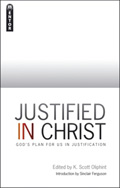
K. Scott Oliphint
Reviewed by: James J. Cassidy
Justified in Christ: God's Plan for Us in Justification, edited by K. Scott Oliphint. Published by Mentor, 2007. Paperback, 309 pages, list price $18.99. Available at www.wtsbooks.com. Reviewed by OP pastor James J. Cassidy.
Mentor (an imprint of Christian Focus Publications) has rendered the church a timely service by publishing Justified in Christ, especially in light of current challenges to the Reformation doctrine of justification. The volume is a collection of essays written by some of the faculty of Westminster Theological Seminary in Philadelphia. The volume ably defends the traditional Reformed view of justification over against recent reformulations from the so-called New Perspective on Paul and the Federal Vision.
The volume's first and last pieces are worth the price of the book in themselves. The introduction is written by Sinclair Ferguson, in which he issues a jeremiad concerning the current state of affairs in the evangelical world—not only is the truth of the gospel under attack, but the very idea of truth itself. An appendix reprints John Murray's magisterial work The Imputation of Adam's Sin.
Between these bookends are articles which address the issue of justification from scriptural, historical, apologetical, and pastoral perspectives. Richard Gaffin tackles the issue of the believer's justification at the final judgment by deconstructing the errors of those who want to make our God-given good works co-instrumental in our justification on the last day. Lane Tipton, with clarity and precision, explains the relationship between union with Christ and justification, according to Scripture and the Reformed tradition. Explaining that union and justification are distinct yet inseparable realities, he cautions us against falling into either Lutheranism, on the one hand, or New Perspectivalism on the other.
Peter Lillback provides a provocative study of how an exclusively forensic view of justification is not found in early Lutheranism, but originates with Calvin. Carl Trueman and Jeffrey Jue contribute insightful articles on the historical context of important seventeenth-century figures. William Edgar explains the social implications of getting justification wrong by looking at French history. Scott Oliphint fleshes out what covenant faith is in its two aspects of original and saving faith, pointing out along the way the errors of the New Perspective in emphasizing the objective faithfulness of Christ to the neglect of the sinner's subjective faith in Christ. Stafford Carson shows the pastoral implications of justification, and Alexander Finlayson rounds off the main part of the book with an extensive bibliography for further reading in the area of justification.
My only criticism is that I wish there were more. Other than that, I believe that the book will help meet current challenges in the church and in the academy. Get one—no, get two: one for yourself and one to give a friend!
June 15, 2025
June 08, 2025
June 01, 2025
Anxiety: Finding the Better Story
May 25, 2025
April 27, 2025
The Devoted Mind: Seeking God’s Face in a World of Distraction
April 20, 2025
April 13, 2025
© 2025 The Orthodox Presbyterian Church